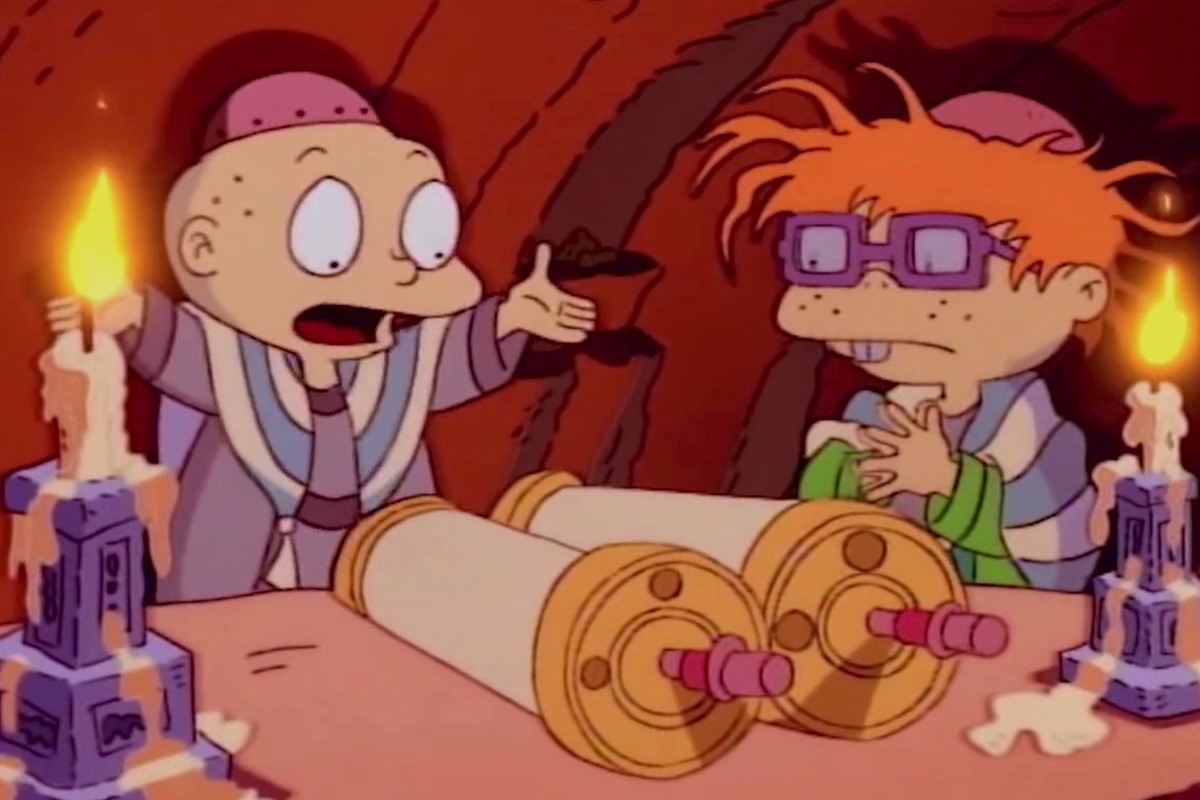Ask any millennial worth their nostalgic salt what they remember watching as a kid, and they will absolutely mention the ’90s gem “Rugrats.”
Created by Arlene Klasky, Gábor Csupó, and Paul Germain for Nickelodeon, “Rugrats” centered on a group of… well, rugrats, and their day-to-day adventures, turning the ordinary into the strange and fantastic through the toddler’s animation. The show was a hit for various reasons, from stellar animation to killer voice-work, yet it stands out most prominently for me is due to its iconic Jewish character, Tommy Pickles.
Tommy Pickles was a daring leader, caring friend, loving brother, and innovative inventor who always walked — err, crawled — around with a plastic screwdriver in his diaper. For many, Tommy was a role model and mirror in which many Jewish kids could see themselves in. Throughout the show’s 13–year run, we got to see Tommy celebrate several holidays, from Christmas to Hanukkah, showing kids of interfaith families that their experiences were common and natural. We got to see Tommy and his family eating traditional Jewish foods like matzah and latkes, learning Jewish stories and traditions, and dealing with the old country mishigas of his Russian American maternal grandparents, Boris and Minka.
In a time when many networks were still hesitant about openly Jewish characters, “Rugrats” was a groundbreaking program. Within the show, we got the standard Hannukah special — the classic episode to indicate that a character’s Jewish — but it was incredible. In that episode we got the iconic line, “A Macca-baby’s gotta do what a Macca-baby’s gotta do,” based off the protagonist’s famous line with a Jewish twist. This episode was also notable for the fact that it was the first children’s series to air a Hanukkah special, especially when other children’s programs featured Christmas-themed episodes as a given standard.
And, not only was there a Rugrats Hanukkah episode, there were multiple Jewish holiday-themed episodes (see: “A Rugrats Passover,” another classic) and continuous references to Jewish culture. Whether it was nods to Jewish foods like latkes, matzah, or Hanukkah gelt, or peppering of Yiddish from his grandparents, like fakakta, tchotchke, and tatela, and of course, Minka’s line of “Boris, did you hurt your shmegegge?”
As a Jewish girl from a secular Ukrainian American Jewish family, I did not grow up going to synagogue. Many of Jewish traditions and rituals were not available to me during my childhood, and I often felt like I was only Jewish in ethnicity and in theory. Watching episodes like the “Rugrats” Passover special, therefore, were my first introduction to Jewish culture from the comfort of my own living room. While Christian kids got their Christmas specials, their holidays automatically off from school, and Disney princess who got married in a church, we got Tommy Pickles on “Rugrats.”
In the follow-up series, “Rugrats: All Grown Up” which aired from 2003 to 2008, we watched Tommy grow up and begin exploring his own connection to Judaism. We watched as Tommy attended Hebrew school (season 4, episode 3 “Rachel, Rachel”); tried figuring out a romantic relationship with different levels of observance (Rachel, the girl he dated was more observant, eating kosher and observing Shabbat, while Tommy did not); and heck, there was even a plot sparked by how there were barely any Hanukkah songs and worked to write one with his brother, Dil (season 4, ep 1, “The Finster Who Stole Christmas.”)
During its original broadcast run from 1991 to 2004, “Rugrats” portrayed a dynamic rarely, if ever, represented in American animated programming: an interfaith family where the protagonist’s Jewishness was a reoccurring and important factor. Edward Delman, author of the article, “How Rugrats Made Me Feel Comfortable in America,” wrote how important the show was to him in representing a Jewish family that looked like his: “’Rugrats’ was alone in offering American Jewish children like myself a consistent portrayal of members of my faith.” Similarly, Danny Goldberg, author of the book “How The Left Lost Teen Spirit” wrote, “I cannot think of any other TV show, animated or otherwise, in which Jewish traditions were so clearly expressed in the context of a mass appeal entertainment.”
Through Tommy Pickles, “Rugrats” gave me, and so many other Jewish kids, an important part of our childhoods. Tommy was to be messy and creative, loving and loved, and, best of all, unapologetically Jewish.
Late Take is a series on Alma where we revisit Jewish pop culture of the past for no reason, other than the fact that we can’t stop thinking about it?? If you have a pitch for this column, please e-mail submissions@heyalma.com with “Late Take” in the subject line.




